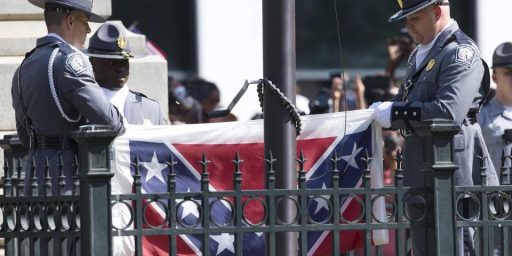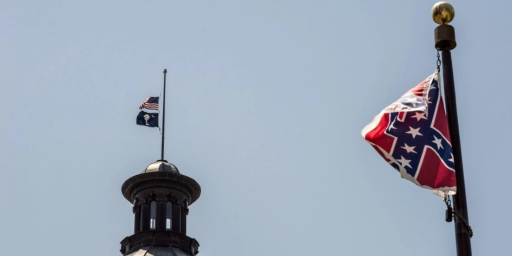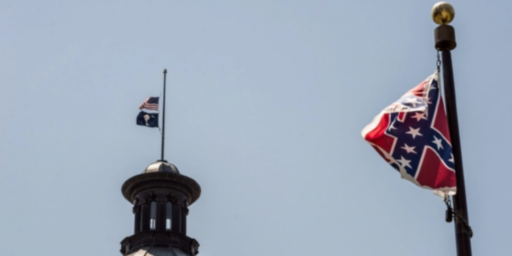George Allen’s Race Problem?
The New Republic features a bizarre profile of George Allen, one of my senators, by Ryan Lizza. It bears the title “GEORGE ALLEN’S RACE PROBLEM.” The page title is “Hee Haw for president” and the subhead is “Pin Prick.”
The subtext is that Allen is a hick or a pseduo-Bubba who is a cross between the worst qualities of George W. Bush, David Duke, and Strom Thurmond.
Senator George Allen is the only person in Virginia who wears cowboy boots.
[…]
The senator has emerged as the principal conservative alternative to John McCain in the early jockeying among 2008 Republican presidential candidates, and today’s event is a reminder of what conservatives love about him.
[…]
It’s credible enthusiasm given that, this afternoon, Allen resembles a froufrou version of Toby Keith. He is wearing a blue button-down shirt and brown pants accented with a fat brass belt buckle that says virginia in stylized, countrified letters. And, of course, he’s wearing the cowboy boots. They are black, broken in, and vaguely reptilian. From his back pocket, he removes a tin of Copenhagen–“the brand of choice for adult consumers who identify with its rugged, individual and uncompromising image,” according to the company–and taps a fat wad of the tobacco between his lip and gum using an impressive one-handed maneuver. As the scrum breaks up, Allen turns away and spits a long brown streak of saliva into the dirt, just missing one of his constituents, a carefully put-together, blonde, ponytailed woman approaching the senator for an autograph. She stops in her tracks and stares with disgust at the bubbly tobacco juice that almost landed on her feet. Without missing a beat, Allen’s communications director, John Reid, reassures her: “That’s just authenticity!”
It’s a word they use a lot it the Allen world–“authenticity.” His aides and the growing ranks of conservative backers hungry for someone to take out McCain emphasize Allen’s down-home credentials and cowboy-boot charisma far more than his voting record. A glowing National Review cover story, to take one recent example, trumpeted Allen’s preternatural fluency in the sports metaphor-laden language of American masculinity. This gift for communicating in the vernacular of John Madden doesn’t just distinguish him; it makes him the ideal vehicle for a particular brand of Republican campaign strategy. As the GOP has grown increasingly adept at turning elections into contests about style and character rather than issues and ideas, some Republicans have become obsessed with finding candidates who can project the cultural identity of a red-state everyman. It sometimes seems that pro-nascar has replaced pro-life as the party’s litmus test.
[…]
But, while Allen may have genuflected in the direction of Gingrich, he also showed a touch of Strom Thurmond. Campaigning for governor in 1993, he admitted to prominently displaying a Confederate flag in his living room. He said it was part of a flag collection–and had been removed at the start of his gubernatorial bid. When it was learned that he kept a noose hanging on a ficus tree in his law office, he said it was part of a Western memorabilia collection. These explanations may be sincere. But, as a chief executive, he also compiled a controversial record on race. In 1994, he said he would accept an honorary membership at a Richmond social club with a well-known history of discrimination–an invitation that the three previous governors had refused. After an outcry, Allen rejected the offer. He replaced the only black member of the University of Virginia (UVA) Board of Visitors with a white one. He issued a proclamation drafted by the Sons of Confederate Veterans declaring April Confederate History and Heritage Month. The text celebrated Dixie’s “four-year struggle for independence and sovereign rights.” There was no mention of slavery. After some of the early flaps, a headline in The Washington Post read, “governor seen leading va. back in time.”
So, thirteen years ago he had a flag collection and a Western collection, displayed separately, that included a Conferate flag (whether the Stars and Bars or the Battle Flag, is unclear) and a noose. I’m betting that he also had a white sheet in a closet displayed as part of a “linen collection.”
The fact of the matter is that Southern politicians play to the cultural sympathies of their region, as do politicians elsewhere. A large number of Southerners are proud of a glorified vision of the Old South, which emphasized honor, independence, courage, and civility. A tiny fraction of those people are segregationists and a tiny subset of that group thinks slavery was fine and dandy. Surely, one does not have to denounce slavery and racism every time one goes to a barbecue.
In his first race in 1979–according to Larry Sabato, a UVA professor and college classmate of Allen’s–he ran a radio ad decrying a congressional redistricting plan whose main purpose was to elect Virginia’s first post-Reconstruction black congressman. Allen lost that race but was back in 1982 and won the seat by 25 votes. He spent the next nine years in Richmond, where his pet issues, judging by the bills he personally sponsored, were crime and welfare. But he also found himself repeatedly voting in the minority on a series of racial issues that he seems embarrassed by today. In 1984, he was one of 27 House members to vote against a state holiday commemorating Martin Luther King Jr. The Richmond Times-Dispatch reported, “Allen said the state shouldn’t honor a non-Virginian with his own holiday.” He was also bothered by the fact that the proposed holiday would fall on the day set aside in Virginia to honor Robert E. Lee and Stonewall Jackson. That same year, he did feel the urge to honor one of Virginia’s own. He co-sponsored a resolution expressing “regret and sorrow upon the loss” of William Munford Tuck, a politician who opposed every piece of civil rights legislation while in Congress during the 1950s and 1960s and promised “massive resistance” to the Supreme Court’s 1954 decision banning segregation.
I would note the the United States Supreme Court, hardly a bastion of racism, struck down many of these majority-minority districts in the 1990s.
Many honorable people opposed the Martin Luther King holiday. Indeed, I still find it amusing that the only people whose birthdays are national holidays are MLK and Jesus Christ. Indeed, George Washington and Abraham Lincoln–together with the other 40 men who have held the office–merit only Presidents Day. And most people don’t even get that day off.
And, surely, governors are allowed to express condolences upon the death of a longtime civic leader, even if his votes were embarrassing in hindsight. It’s often a decent and honorable thing to do. Bill Clinton attended the funeral of and delivered a warm eulogy to Richard Nixon. That does not mean he was condoning Watergate.
Update: Taegan Goddard and Ezra Klein point to a passage deeper into the piece wherein Allen wore a Confederate flag lapel pin for a high school yearbook photo. In California, no less. This one is harder to explain away, to be sure, although I tend not to be too concerned with high school behavior of people who have a long public record.
Update 2: Kevin Drum thinks this about “authenticity” rather than racism.
Allen’s red state good ‘ol boy schtick is little more than a personal invention, carefully cultivated and maintained through the years, should at least give the press corps pause as they cover his campaign. They’ve gotten suckered by this act before, and both McCain and Allen are currently gearing up to sucker them again with the same song in a different key.
While I’m sure the cowboy boots and “aw shucks” manner are partly cultivated on Allen’s part, his explanation that he adapted such things as the Confederate flag as counter-culture symbols while in high school strikes me as perfectly plausible. His football coach father was apparently staunchly conservative, a tee-totaler, and so forth. Growing up in a macho, conservative household while in the 1960s/early 1970s Los Angeles area presumably created a certain cognitive dissonance and a need to make a choice between the two cultures. Affecting good ol’ boy symbols is a way of doing that.





We all understand that politicians pose and attempt to enhance their image. George Allen is a southerner and cultivates the image. But for a former UVA tae kwon do student to allow him self to be photographed wearing a black belt that he did not earn is a bit much.
He’s guilty of a Tae Kwon Don’t?
When Allen was in high school (60s&70s) the Stars and Bars was a counter-culture symbol as well as a neo-Confederate emblem.